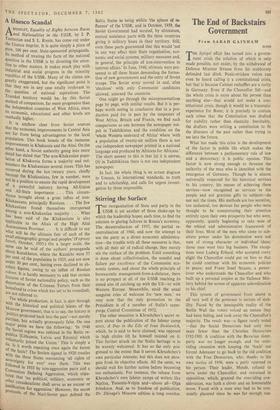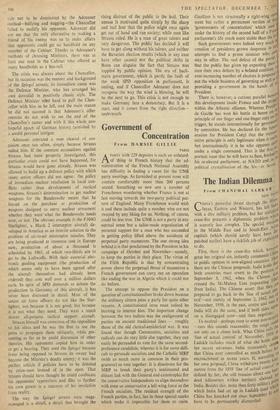The End of Backstairs Government
From SARAH GAINHAM BONN
HE Spiegel affair has turned into a govern- ' ment crisis the solution of which is only made possible, not easier, by the withdrawal of Defence Minister Strauss from his stubbornly defended last ditch. Panic-stricken voices can even be heard calling it a constitutional crisis, but that is because Cabinet reshuffles are a rarity in Germany. Even if the Chancellor fell—and the whole crisis is more about his person than anything else—that would not make a con- stitutional crisis, though it would be a traumatic experience for Bonn; it is precisely to contain such crises that the Constitution was drafted for stability rather than elasticity. Inevitably, the drafters were writing a constitution to fit the disasters of the past rather than trying to see into the future.
What has made this crisis is the development of the factor in public life which makes the difference between a parliamentary rule of law and a democracy; it is public opinion. This factor is now strong enough to threaten the authority of the man who is identified with the resurgence of Germany. Though he is almost universally respected for his historical services to his country, his means of achieving these services—now recognised as services to the people and not gracious gifts to subjects—do not suit the times. His methods are too secretive, too unilateral, too devious for people who were thought to be concentrating their attention entirely upon their own prosperity but who were, apparently, quietly beginning to take note of the ethical and administrative framework of their lives. Most of the men who came to sub- altern power under his domination were not men of strong character or individual ideas; those men went into big business. The excep- tions were Ludwig Erhard, who accepted every slight the Chancellor could put on him so that he could continue with his economic policies in peace; and Franz Josef Strauss, a power- lover who understands the Chancellor and who built up a personal empire at the Defence Min- istry behind the screen of apparent subordination to his chief.
This system of government from above is all very well if the governor is certain of stab- ility. Faced by the inescapable reality of the Berlin Wall the voters voiced an unease they had been biding, and took away the Chancellor's majority. The result was—a figure rarely noted —that the Social Democrats had only two seats fewer than the Christian Democrats (192-190). A coalition with the Bavarian sister- party was no longer enough, and the over- riding obsession with keeping the `Socis' out forced Adenauer to go back to the old coalition with the Free Democrats, who, thanks to his own tactics of 1956, were a party opposed to his person. Their leader, Mende, refused to serve under the Chancellor, and remained in opposition, which, granted the overriding con- sideration, was both a clever and an honourable move. Faced with a man who had to be con- stantly placated since he was far enough out- side not to be dominated by the Adenauer method—bullying and nagging—the Chancellor failed to mollify his opponent. Adenauer did not see that the only alternative to making a friend of his enemy was so to order affairs that opponents could get no handhold on any member of the Cabinet. Thanks to Adenauer's methods of choosing Ministers, there was at least one man in the Cabinet who offered as many handholds as a bus-rail.
The crisis was always about the Chancellor, but its occasion was the manner and background of the Spiegel arrests; its immediate cause was the Defence Minister, who has arranged his own downfall in positively classic style. The Defence Minister tried hard to pull the Chan- cellor with him as he fell, and the main reason he did not succeed is that Adenaucr's other enemies do not wish to see the end of the Chancellor's career and with it this whole new hopeful epoch of German history tarnished by a sordid personal intrigue.
Adenauer tolerated a man cleared of sus- picion once too often, simply because Strauss suited him. If the constant accusations against Strauss had been properly investigated, this particular crisis could not have happened, for Strauss would have gone already. Strauss was allowed to build up a defence policy with which many senior officers did not agree: the policy of immediate nuclear retaliation in local con- flicts rather than development of tactical weapons. Strauss's determination to get nuclear weapons for the Bundeswehr meant that he forced on the purchase or produCtion of weapons designed to carry nuclear armament whether they were what the Bundeswehr needs now, or not. The obvious example is the F104G Starfighter, a Mach 2 interceptor aircraft de- veloped in America as an interim solution to the problem of air-to-air interceptor missiles. They are being produced at immense cost in Europe now; production of about a thousand is scheduled by 1965, of which two-thirds are to go to the Luftwaffe. With their essential elec- tronic guiding equipment (the production of which seems only to have been agreed after the aircraft themselves had already been ordered) they cost well over a million dollars each. In spite of SPD demands to debate the production in Germany of this aircraft, it has never been discussed in detail. Most of the senior air force officers do not like the Star- fighter, not because it is not good; but because it is not what they need. They want a much slower all-purpose tactical support aircraft.
Strauss himself was conscious of the opposition to his ideas and he was the first to use the press to propagate them obliquely, while pre- venting as far as he could discussion of other theories. His opponents copied him in order to get a hearing. They used the Spiegel because from being opposed to Strauss its owner had become the Minister's deadly enemy; it was the perfect vehicle if policies have to be debated by straw-men instead of in the open. That Strauss should have thought he could confiscate his opponents' typewriters and files to further his own power is a measure of his insulation from reality.
The way the Spiegel arrests were stage- managed is a detail, a detail that brought the rising distrust of the public to the boil. Their unease is motivated quite simply by the sharp and real fear that the police might once again get out of hand and run society; while men like Strauss ruled. He is a man of great talents and very dangerous. The public has decided it will have to get along without his talents, and neither the Bavarian election results (which in any case have other causes) nor the political shifts in Bonn can disguise the fact that Strauss was toppled by public opinion. The era of back- stairs government, which is partly the fault of the weak SPD opposition in parliament, is ending, and if Chancellor Adenauer does not recognise the way the wind is blowing, he will be the next to go. This crisis is not enough to make Germany into a democracy. But it is a start, and it comes from the right direction— underneath.







































 Previous page
Previous page